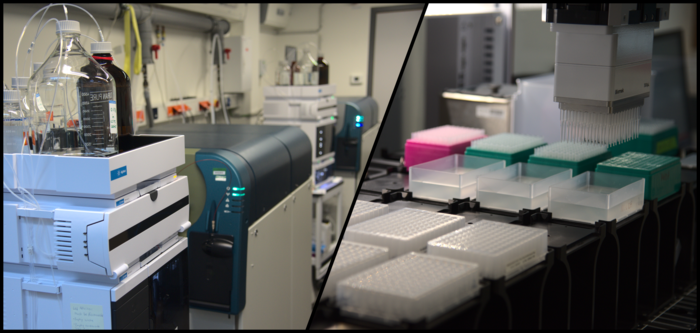A single blood sample from a critically ill COVID-19 patient can be analyzed by a machine learning model which uses blood plasma proteins to predict survival, weeks before the outcome, according to a new study published this week in the open-access journal PLOS Digital Health by Florian Kurth and Markus Ralser of the Charité – Universitätsmedizin Berlin, Germany, and colleagues.

Credit: Johannes Hartl, Charité
A single blood sample from a critically ill COVID-19 patient can be analyzed by a machine learning model which uses blood plasma proteins to predict survival, weeks before the outcome, according to a new study published this week in the open-access journal PLOS Digital Health by Florian Kurth and Markus Ralser of the Charité – Universitätsmedizin Berlin, Germany, and colleagues.
Healthcare systems around the world are struggling to accommodate high numbers of severely ill COVID-19 patients who need special medical attention, especially if they are identified as being at high risk. Clinically established risk assessments in intensive care medicine, such as the SOFA or APACHE II, show only limited reliability in predicting future disease outcomes for COVID-19.
In the new study, researchers studied the levels of 321 proteins in blood samples taken at 349 timepoints from 50 critically ill COVID-19 patients being treated in two independent health care centers in Germany and Austria. A machine learning approach was used to find associations between the measured proteins and patient survival.
15 of the patients in the cohort died; the average time from admission to death was 28 days. For patients who survived, the median time of hospitalization was 63 days. The researchers pinpointed 14 proteins which, over time, changed in opposite directions for patients who survive compared to patients who do not survive on intensive care. The team then developed a machine learning model to predict survival based on a single time-point measurement of relevant proteins and tested the model on an independent validation cohort of 24 critically ill COVID-10 patients. The model demonstrated high predictive power on this cohort, correctly predicting the outcome for 18 of 19 patients who survived and 5 out of 5 patients who died (AUROC = 1.0, P = 0.000047).
The researchers conclude that blood protein tests, if validated in larger cohorts, may be useful in both identifying patients with the highest mortality risk, as well as for testing whether a given treatment changes the projected trajectory of an individual patient.
#####
In your coverage please use this URL to provide access to the freely available article in PLOS Digital Health: https://journals.plos.org/digitalhealth/article?id=10.1371/journal.pdig.0000007
Citation: Demichev V, Tober-Lau P, Nazarenko T, Lemke O, Kaur Aulakh S, Whitwell H, et al. (2022) A proteomic survival predictor for COVID-19 patients in intensive care. PLOS Digit Health 1(1): e0000007. https://doi.org/10.1371/journal.pdig.0000007
Author Countries: Germany, United Kingdom, Russia, Austria, Sweden
Funding: For full statement, see press-only preview (above). The funders had no role in study design, data collection and analysis, decision to publish, or preparation of the manuscript.
Competing Interests: The authors declare no competing interests. Author John F. Timms was unable to confirm their authorship contributions. On their behalf, the corresponding author has reported their contributions to the best of their knowledge.
DOI
10.1371/journal.pdig.0000007
Article Title
A proteomic survival predictor for COVID-19 patients in intensive care
Article Publication Date
18-Jan-2022
COI Statement
The authors declare no competing interests. Author John F. Timms was unable to confirm their authorship contributions. On their behalf, the corresponding author has reported their contributions to the best of their knowledge.




